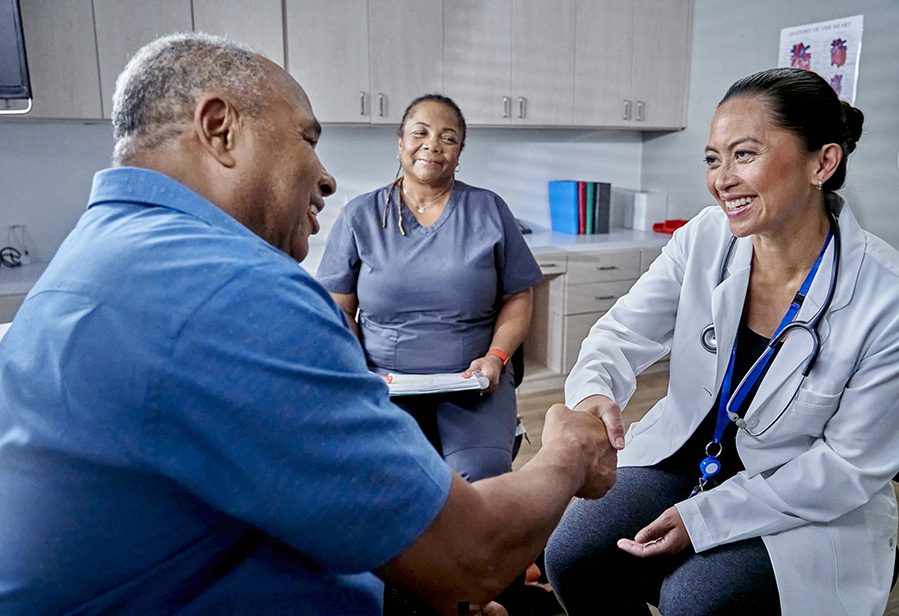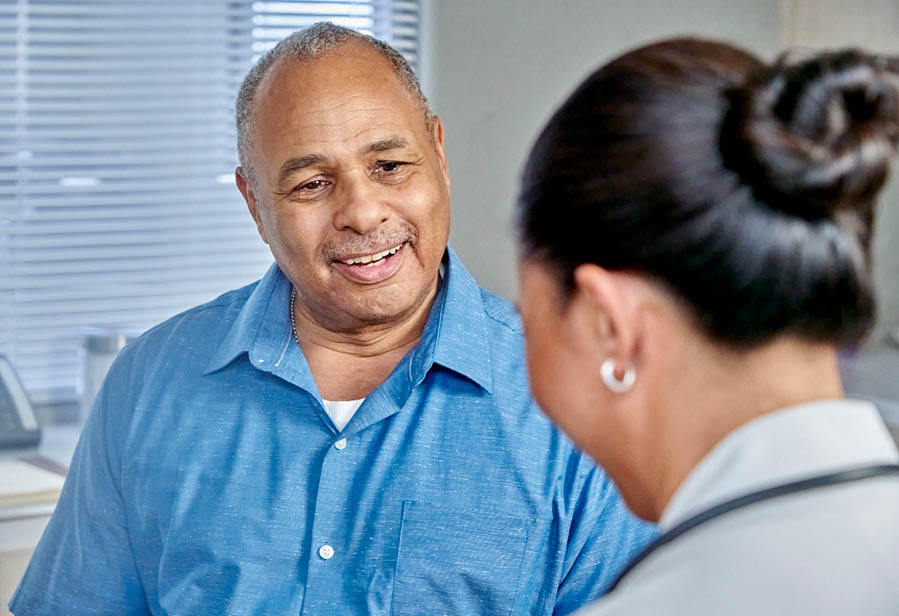Managing osteoporosis is possible with lifestyle changes and attention to your overall health. A good relationship with your healthcare provider can help you to understand what causes osteoporosis and how to make lifestyle choices to help keep bones healthy and strong.

What is Osteoporosis?
Osteoporosis is a serious bone disease. Bones lose density and mass, leading to weakness and fragility. If you have osteoporosis, it is more likely you will break a bone. The most common breakpoints for people with osteoporosis are the wrist, back, or hip.
Who Gets Osteoporosis?
Anyone can get osteoporosis. Women get the disease more often than men. It is more common among older people and in those who have a family history of osteoporosis. There are also many risk factors that make it more likely to get the disease.
Risks and Causes
Bone changes over a lifetime. The body breaks down bone as it ages and replaces it with new bone mass. This process starts to slow at about age 30. As you get older, bone continues to break down, but the body doesn’t make as much new bone as it used to.
Not everyone gets osteoporosis. There are some risk factors, some you can manage through osteoporosis lifestyle changes that help you to keep your bones healthy. Others, like age and genetics, you cannot control.
What Can You Control?
You can reduce your risk for osteoporosis by paying attention to certain things. It can help to have the advice and guidance of a doctor while you make lifestyle changes, as these changes may involve balancing osteoporosis risk with other aspects of your health.
- Diet and exercise. The risk of osteoporosis goes up if your diet is low in vitamin D or calcium. Not getting enough exercise can also increase the risk.
- People who are thin and have a small frame are at a greater risk for the disease.
- Smoking and alcohol. Smoking prevents your body from using calcium in the right way. Smoking can also bring on early menopause, which can increase osteoporosis risk. Drinking alcohol also makes developing osteoporosis more likely.
- Prescription medications. Some medications, like glucocorticoids for arthritis and asthma, may cause bone loss. If you are taking these medications, you can discuss the risk of osteoporosis with your doctor.
These may seem like small things, but they can make a big difference to your bone health.
What Can’t You Control?
Some things that you can’t control increase the likelihood you will get osteoporosis. These include:
- The risk of osteoporosis increases with age for both women and men.
- Women get osteoporosis more frequently than men. Doctors say this is because women on average may have smaller bones. Women also experience hormone changes after menopause that cause them to lose bone mass at a faster rate than men. By the age of 65 or 70, this post-menopausal bone loss slows and women and men lose mass at about the same rate.
- Family history. You are more likely to get osteoporosis if a close relative also had the disease.
- All people are at risk for osteoporosis, but women of Asian or Caucasian backgrounds get it more frequently than do members of other communities.
If you are at greater risk for osteoporosis, you can take action through bone screening, maintaining a healthy lifestyle, and communicating regularly with your doctor.
Can My Bones Be Tested?
If you are at risk for osteoporosis, your doctor can do tests to monitor your bone health. Without testing, many people don’t know they have osteoporosis or low bone mass until they break a bone. At Intermountain Health, we recommend a bone mineral density test as part of our health screenings for seniors.
How Can I Keep My Bones Strong to Prevent Osteoporosis?
You can make some lifestyle choices to help bones stay healthy and strong. These can help protect you from osteoporosis, even if you have risk factors that you cannot control.
Calcium and Vitamin D
Increase your intake of calcium and vitamin D. Sources of calcium include:
- Low-fat dairy products
- Calcium-fortified soy milk and tofu
- Green leafy vegetables
Sources of vitamin D include:
- Egg yolks
- Saltwater fish
- Liver
If you have trouble getting enough calcium and vitamin D in your diet, you can consider an over-the-counter vitamin supplement.
Food
In addition to getting plenty of calcium and vitamin D, try to eat a healthy, well-balanced diet. This will strengthen your body overall and help you to maintain an exercise routine that supports bone health.
Exercise
Aim for 30 minutes of daily physical activity. Strength-bearing and weight-bearing exercises are best for bone health. Choose activities like lifting light weights, walking, and climbing stairs.
Why is Bone Health So Important?
Bone health is critical to overall health. Not only do bones allow for movement during daily activities, but they protect the body’s vital organs. Bones also store vital minerals like phosphorus and calcium that the rest of the body also needs to stay healthy.
What Affects Bone Health?
Lifestyle, family history, diet, exercise, medications, and general wellbeing all contribute to bone health. Your risk for osteoporosis increases with age, so to keep bones strong, it’s a good idea to eat a well-balanced diet with plenty of calcium and vitamin D. Strength-building exercise can help you keep more bone mass. Regular bone density screenings can provide an early indication of the onset of osteoporosis.
Do Men Get Osteoporosis?
Men do get osteoporosis, although not as often as women. Low bone mass affects about 54 million Americans, according to the National Osteoporosis Foundation. About 1 in 2 women and 1 in 4 men over the age of 50 will suffer a broken bone because of osteoporosis.
What Questions Should You Ask Your Provider?
Your doctor is one of the best sources of information about osteoporosis. Here are some questions you may want to ask them during your next visit:
- Am I at risk for osteoporosis?
- Do you recommend any osteoporosis lifestyle changes?
- Should I change my diet?
- Should I take supplements?
- What kind of exercise do you recommend?
- Should I change any medication I am taking?
- How can I prevent falls or breaks?
Your doctor will give you the advice that’s right just for you, given your unique health situation.
Why Choose Intermountain Health?
At Intermountain Health, we are dedicated to trustworthy, patient-focused care. We are committed to the health of our community and the people we serve. Our team offers care in specialized areas, like senior health at the myGeneration Senior Clinics. No matter the location, we can answer your questions about osteoporosis, general health, and more. Find a provider in your area today.
*This article is for informational purposes only and is not intended to be a substitute for medical advice or diagnosis from a physician or qualified healthcare professional.





